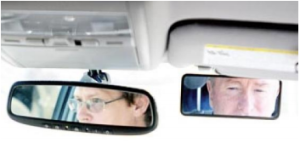Could you still pass a driving test? ‘Daily News’ reporter didn’t quite make the grade
Darrell Bellaart, Nanaimo Daily News, April 13, 2015

Daily News’ reporter Darrell Bellaart, left, and driving instructor Steve Wallace.
Photograph By Aaron Hinks/Daily News
I knew I’d failed the second I stopped the car on top of the crosswalk.
I took the ICBC driver re-examination road test as a personal challenge to the claim seniors
driving tests are unfair. I went into the examination brimming with confidence.
Forty-five minutes later I was eating humble pie.
Now let me point out I am a pretty good driver. My examiner, Steve Wallace of Wallace
Driving School, said so himself several times during the testing.
But the experience confirmed something Wallace tells anyone facing a driver examination:
Road tests are not as much about driving skills as a test of a driver’s observational skills.
At 80, B.C, drivers must see a doctor for a medical examination report to determine their fitness
to drive. The examination is required every two years after that. If there are concerns, Road
Safety B.C. will either make a decision on the driver’s licence or order a test.
I got my Class 5 licence in Calgary in 1977. While my shortterm memory isn’t as good as it
was 20 years ago, I’ve still got a way to go before ICBC requires orders me to go for retesting.
Why did I take the test?
I contacted driving instructor Steve Wallace almost a month ago, after reading something he’d
told a colleague in a Daily News interview, on the topic of seniors road testing. Wallace, the
CEO of Joan Wallace Driving School, told reporter Spencer Anderson senior driver testing is unfair.
“I could test you tomorrow and you would fail,” he said. That was a red flag for me.
“I’ll show him,” I thought as I picked up the phone and called his office.
He was more than willing to oblige when I asked to take the test. At his driving school, I found
myself sitting through a session on the importance of preparation for testing – even for
experienced drivers. That’s when I felt the first twinge of nervousness. I searched my memory
each time I heard Wallace use the term “360-check,” and nothing was coming up. He described
the two types of testing available in B.C.: the privately-run DriveAble examination, which he
said is extremely difficult, especially for seniors with low computer skills, and the ICBC road
test, which 50 per cent of drivers can beat “with preparation.”
It was the test I was about to take, but I was still confident I’d easily pass it. I aced my taxi
licence at age 21, so how hard could it be?
Behind the wheel, the simplistic Toyota Prius dashboard was strangely intimidating. “Just press
the button,” he said, pointing to the round ignition switch on the dash.
Then, noticing my confused look, he instructed me move the tiny stick-shift over and down into
the “D” position. After carefully checking both mirrors and a quick glance left, I prepared to
pull away. “Did you shoulder check?” he asked. “I thought I did,” came my embarrassed reply.
The test hadn’t started yet and already I was starting to perspire. We pulled away and headed to
Woodgrove Centre, for a warmup parking exercise. After watching me confidently merge into
busy traffic on the Parkway, he gave his assessment: “Watch the gaps in traffic, not the cars,” he
told me.
That threw me for a loop. I’d been merging into traffic since I age 19, and considered myself an
expert. At Woodgrove, I dutifully parked in a pull-through spot, so I could pull away safely
later. When I did go, I remembered to do a 360-check. If, like me, you learned to drive in the
Pleistocene era, you can be excused for wondering what this is.
By now Wallace had given me a crash course: Left, left mirror, ahead, rear-view mirror, right,
then right mirror and eyes back on the road.
Simple, huh? I had mentally digested this while maneuvering through mid-day highway traffic,
and now, I was trying to file this away and make it part of my almost 40 years of driving
experience. It was consuming a lot of CPU power in my shrinking, though not-yet senior brain.
Pulling away, I concentrated hard on the all-important check. “You didn’t signal,” came the
voice from the back seat. Daily News photographer Aaron Hinks was there to record the ordeal.
The test hadn’t officially started and already my stress level was rising. We headed to the ICBC
test centre, where Wallace had me do a three-point turn to back into the stall and start the test.
While backing in I made my first huge error. With my left hand on the wheel and my eyes
behind me, I forgot my 360.
“It’s a testable situation where you’re already stressed,” Wallace said afterward. “The worst
you’ll ever drive is when you’re stressed.”
Later, some residential driving in Parkwood involved me stopping at a T-intersection. By now I
knew to shoulder check right, when rounding a corner on a right-hand turn. This wasn’t taught
when I learned to drive. Now it’s a test requirement, in case a cyclist blows past, between your
vehicle and the curb. The idea was completely new to me, and it was all I was thinking hard
about when I came to a stop past the stop line. “You blew it,” came the voice in the back seat.
I knew Hinks was right. Later, he said he found the exam stressful, just as an observer in the
back seat. I made a number of other errors, some small – in my mind – and others more serious.
A new driver fails the test after three minor errors, or any error so serious it terrifies the
instructor. A senior being retested gets five points against him for every error, and is failed if
they reach 60 points.
Either way you count it, I’d failed, despite my confidence at the start. “You’re well above an
average driver,” Wallace said. “My point is unless you prepare for this, there’s a very strong
likelihood you’re going to fail the test.” For him, it illustrates how mandatory testing at age 80 is arbitrary and discriminatory. He said given the changing requirements put upon drivers, and
since drivers can naturally develop bad habits, a better system would be to re-test people
periodically – say, every 15 years from age 30 or 35 onward. It’s given me a new respect for any
senior able to successfully make it through an age-required retest.
DBellaart@nanaimodailynews.com
250-729-4235


